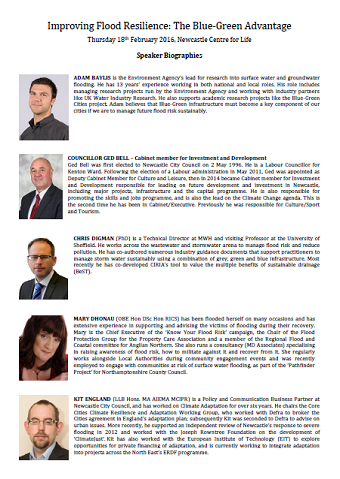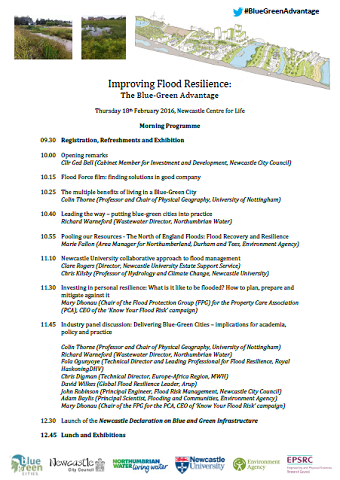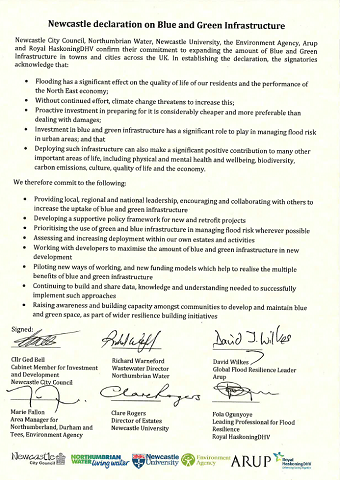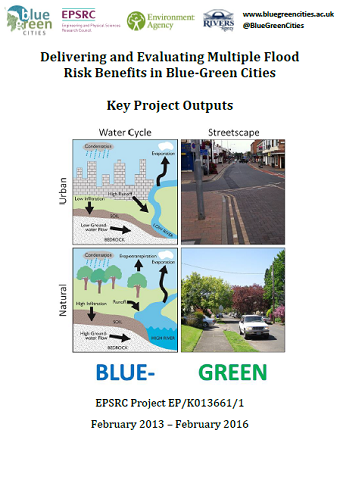Newcastle Dissemination Event 2016

Improving Flood Resilience: The Blue-Green Advantage
We need to get more for less in flood risk management. Climate change, economic development and growth increase risk, whilst funding is ever more constrained. Blue-Green infrastructure can help manage these risks whilst offering other multiple benefits; improved quality of life for communities via benefits to health, wellbeing and recreation, increased climate protection from heat and floods, improved air quality, carbon storage, and reduced noise, energy and water pollution. However, putting such schemes into practice is challenging due to complex governance, finance and significant up-front time needed for project development.
Over the past three years, the Blue-Green Cities team from nine leading Universities have researched cutting edge techniques for advancing Blue-Green approaches, from better modelling of water and sediment flows to creating new tools to evaluate the multiple benefits and determine stakeholder perceptions and values. In parallel, local partners including Newcastle City Council, Northumbrian Water, the Environment Agency and Newcastle University have explored what these approaches mean for the city and developed working relationships which seek to influence a Blue-Green Vision for Newcastle.
This event disseminated our research findings and launched a pledge to support a Blue-Green Vision, encouraging partners and the wider region to sign the pledge and collaborate to make it a reality.
See article in the Newcastle Chronicle 'Newcastle helps lead the way in blue-green cities move to combat flood risk'.
Keynote speakers included:
- Cllr Ged Bell, Cabinet Member for Investment and Development
- Richard Warneford, Waste Water Director, Northumbrian Water
- Marie Fallon, Area Manager – North East, Environment Agency
- Colin Thorne, Blue-Green Cities project lead, University of Nottingham
- Chris Kilsby and Clare Rogers, Newcastle University
- Mary Dhonau, MDA Community Flood Consultants
Industry panel discussion included:
- Richard Warneford (Waste Water Director, Northumbrian Water)
- John Robinson (Principal Engineer, Flood Risk Management, Newcastle City Council)
- Fola Ogunyoye (Technical Director and Leading Professional for Flood Resilience, Royal HaskoningDHV)
- Christopher Digman (Technical Director, Europe-Africa Region, MWH)
- David Wilkes (Global Flood Resilience Leader, Arup)
- Adam Baylis (Principal Scientist, Flooding and Communities, Environment Agency)
- Mary Dhonau (Chair of the Flood Protection Group for the Property Care Association, CEO of the ‘Know Your Flood Risk’ campaign)
- Colin Thorne (Professor and Chair of Physical Geography, University of Nottingham)
Downloads
Presentations
Morning session
The multiple benefits of living in a Blue-Green City (Colin Thorne, University of Nottingham) 
Leading the way – putting blue-green cities into practice (Richard Warneford, Northumbrian Water) 
Pooling our Resources - The North of England Floods: Flood Recovery and Resilience (Marie Fallon, EA) 
Newcastle University collaborative approach to flood management (Clare Rogers, Chris Kilsby, Newcastle University) 
Investing in personal resilience: What is it like to be flooded? How to plan, prepare and mitigate against it (Mary Dhonau, Flood Protection Group for the Property Care Association) 
Afternoon session
Overcoming uncertainties and barriers to Blue-Green infrastructure (Emily O’Donnell, University of Nottingham) 
Using the CityCAT flood model for design of Blue-Green infrastructure (Chris Kilsby and Vassilis Glenis, Newcastle University) (PPT 96 MB)
Evaluating multiple benefits of Blue-Green infrastructure schemes through GIS (Richard Fenner and Malcolm Morgan, University of Cambridge) 
Changing perceptions and behaviours around Blue-Green infrastructure (Jessica Lamond and Glyn Everett, UWE) 
Next steps for the Newcastle Learning and Action Alliance (Kit England, Newcastle City Council) 
Delivering and valuing the multiple benefits of SuDS (Paul Shaffer (CIRIA) and Chris Digman (MWH))
Speaker biographies

Event agenda

Newcastle Blue and Green Declaration

Key Blue-Green Cities Project Outputs

Venue and directions
The Newcastle Centre for Life is located just two minutes' walk from Newcastle Central Station in the heart of the city. Access to the conference suites is via the main entrance on Central Parkway, just off Neville Street. Central Parkway is a private road which is accessible on foot from Neville Street and Railway Street.
The Sat Nav reference for the nearest car park (Times Square Car Park) is NE4 7AD. If you need to park on site, please contact the venue to arrange this in advance.
Please visit the Centre for Life website for detail directions to the venue.
